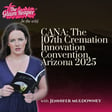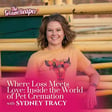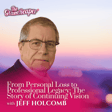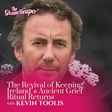
Flameless Cremation: A Change for the Better with Ed Gazvoda
Ever heard of flameless cremation? If you haven’t yet, it’s about time you did! Welcome to another episode of the Glam Reaper Podcast, where host Jennifer talks about life, love, loss, and funerals.
Today’s special guest is Ed Gazvoda, president of Fireless Cremation and co-inventor of aquamation 2.0 for humans, pets and labs. In this intriguing episode, Ed gives us an overview of fireless cremation–what it is and all the processes involved. Delve into a real eye-opener as Ed takes us on a deep dive into the science of alkaline hydrolysis and some of the legalities involved in the process.
Curious to know how this form of cremation differs from the usual one you know? Hit the play button and jump right in!
LITTLE NUGGETS OF GOLD:
- A little background about Ed and how he started his business
- More information about alkaline hydrolysis and its legal bases
- The difference between fireless cremation and regular cremation
- All about fireless cremation and the processes involved
Connect with Ed Gazvoda:
Website: https://firelesscremation.com/
Facebook: https://www.facebook.com/firelesscremationsystem
Instagram: https://www.instagram.com/firelesscremation/
Twitter: https://twitter.com/FirelessC
YouTube: https://www.youtube.com/channel/UCcQnOrAjj6dBiSOYxx4e1vQ
LinkedIn: https://www.linkedin.com/company/firelesscremation
Connect with Jennifer/The Glam Reaper:
Facebook Page - Muldowney Memorials: https://www.facebook.com/MuldowneyMemorials/
Facebook Page - Rainbow Bridge Memorials: https://www.facebook.com/rainbowbridgememorialsdotcom
Instagram - @muldowneymemorials & @jennifermuldowney
Twitter - @TheGlamReaper
Email us here: glamreaperpodcast@gmail.com



















